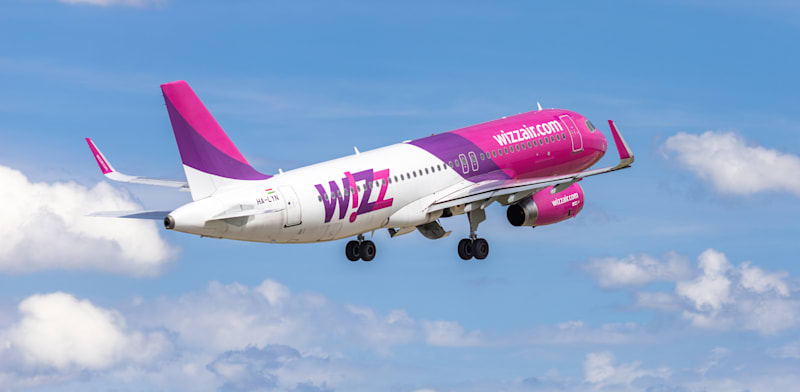Senior officials from Israel’s Ministry of Transport have traveled to Hungary for intensive talks with top Wizz Air executives about setting up a hub in Israel for the low-cost Hungarian airline. If the move goes ahead, it is expected to spark competition in airfares, much to the dismay of Israeli airlines, which strongly oppose the plan.
However, “Globes” has learned that at this stage there is at least one obstacle that threatens to torpedo the move. Wizz Air is demanding that the principle of “seventh freedom of flight” be implemented in the agreement with Israel – a term from the aviation sector that allows, as part of agreements, the right of an airline from a particular country to operate flights between two other foreign countries, regardless of its home country.
Simply put: Wizz Air is striving to compete with Israeli companies to operate flights to the Balkans, the Caucasus and the United Arab Emirates from its base of operations in Israel. Since the airline is registered in Europe and does not intend to register as an Israeli company, as it wishes to avoid the Israeli regulation that applies to Israeli companies, it is essentially seeking to change the aviation laws in Israel, in a precedent-setting manner.
Wizz Air previously operated a hub based on its subsidiary in Abu Dhabi, but this was closed. The company apparently wants to regain its profitable route and operate flights between Israel and Dubai and Abu Dhabi.
According to industry sources, this is an unprecedented request that is doubtful to be agreed to legally and practically, but Wizz Air seems to be insisting on it.
Plotting to take over Ryanair’s slots
“Globes” has also learned that Wizz Air is plotting to take over the flight slots currently allocated to one of its major rivals – Irish low-cost airline Ryanair – which stopped flying to Israel during the war and has not yet resumed operations, charging that the Israel Airports Authority’s is refusing to confirm Ryanair’s historic slots for summer 2026 and refusing to confirm that low-cost Terminal 1 will remain open during future security events.
The Israeli delegation to Hungary includes Minister of Transport director general Moshe Ben Zaken, and Israel Airports Authority head Sharon Kedmi. Conspicuous by their absence from the delegation are members of the Civil Aviation Authority, who in the past expressed opposition to the entire move and claimed that it would harm Israeli companies.
This claim is backed up by the Israeli airlines that currently enjoy great priority in the distribution of slots at Ben Gurion Airport, as they are based in Israel. If they have to share the priority at the airport with a foreign company, this will certainly harm their competitiveness.
RELATED ARTICLES
Israel-US fares stay high despite return of foreign carriers
Five airlines resuming Israel flights
Ryanair refuses to renew Israel flights
However, the government believes that the aviation industry, which has recorded record profitability in recent years, can remain profitable through streamlining. In the meantime, Arkia has contacted the Ministry of Transport through the Firon law firm and claimed that the Minister of Transport does not have the authority to agree to such a hub, without approval from the Civil Aviation Authority, which opposes the move.
Wizz Air has been trying to establish a hub in Israel for several years but has been refused by local industry regulators. In the past year, the Ministry of Transport has been taking a different approach, designed to legitimize the move. Minister of Transport Miri Regev is even trying to portray the move as one of the outstanding achievements of her term.
A hub of operations would allow Wizz Air to set Israel as the starting and ending point of its flights, with the presence of aircraft and crews in Israel, which allows the company to operate more round trip flights and enjoy valuable slots (flight and takeoff times that are distributed to companies according to the airport’s capacity), and thus establish a deeper foothold in the local market.
Currently, local airlines have a comparative advantage in that their planes “stay” in Israel and can take advantage of the first and last slots of the day, which are preferred by passengers. If Wizz Air establishes a hub in Israel, it will be able to enjoy the same terms and become a dominant player during peak hours. It will also be able to continue to be a foreign company, so that it will not be subject to the strict regulation of Israeli companies – such as strict security arrangements and coordination with El Al, which is not only a competing company, but also the provider of security services in the industry.
In previous meetings, it emerged that Wizz Air intends to open its base of operations in Israel ahead of the next summer season, which will begin in April 2026, with three aircraft based in Israel, and that the company aims to operate up to 60 flights per day.
Published by Globes, Israel business news – en.globes.co.il – on October 28, 2025.
© Copyright of Globes Publisher Itonut (1983) Ltd., 2025.
























